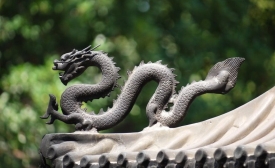kenya

Can China win Africa's heart? This video from Quartz News examines Chinese developments in Kenya and the attendant challenges for engaging on a personal level.
According to Chinese vice Premier Zhang Gaoli, the media has a crucial role to play in ensuring that people all over the world understand what Belt and Road initiative is all about. [...] The NPC official, just like the vice premier, however admitted that a lot needs to be done to get more people to understand what the concept stands for. In his opinion, the “project of the century” as is being referred to, seeks to only build a community of shared future and prosperity for all.
Kenya's last two general elections have been tarnished by allegations of fraud and outbreaks of violence, which have divided the nation since. The country is hailed as Africa's Silicon Savannah and when citizens head to the polls again on 8th August, they will be using technology to make sure these elections are free and credible.
Tourism is one of the main income sources of developing countries. For Kenya, one of Africa's leading tourism destinations, the industry is the country's second largest source of foreign exchange after agriculture. [...] Currently Kenya is serviced from the key long-haul source markets by five international full-service airlines that fly direct from their hub to Nairobi.
President Uhuru Kenyatta has many women - in his Presidency. [...] Unlike his old man, President Uhuru has many women who, behind the scenes, are said to be the ‘soft power’ of his presidency. And more than ever before, these women hold crucial positions even as Uhuru bids for a second term in the do-or-die August 8 General Election.
Drought in a developing country can mean many things: a lack of water, a lack of food and nutrition, and a lack of economic growth that puts even more pressure on impoverished communities relying on farming for their livelihoods. For women and girls, it also means a lack of protection. [...] But a new initiative in rural northern Kenya turns to technology and members of the community to make the region safer, and put an end to gender-based violence.
On a dirt path that passes for a street in a Kenyan refugee camp, a merchant sells grains he bought from a local farmer outside the settlement. To call it an “economy” would be euphemistic, but it’s a living, and it’s enough to support his wife and two children — a family he’s built since arriving at the camp over a decade ago. [...] Mastercard and Western Union have spent the past year studying the needs of these international camps-turned-cities.







